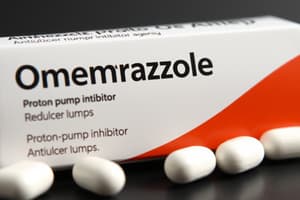Podcast
Questions and Answers
What is the therapeutic classification of Omeprazole?
What is the therapeutic classification of Omeprazole?
- Antidepressants
- Antiulcer agents (correct)
- Antihistamines
- Antibiotics
What is the pharmacologic classification of Omeprazole?
What is the pharmacologic classification of Omeprazole?
- Proton-pump inhibitors (correct)
- Calcium channel blockers
- Thrombolytics
- Beta-blockers
What are the indications for Omeprazole?
What are the indications for Omeprazole?
GERD, maintenance of healing in erosive esophagitis, duodenal ulcers, reduction of risk of GI bleeding in critically ill patients, OTC for heartburn occurring more than twice a week.
How does Omeprazole act in the body?
How does Omeprazole act in the body?
What are contraindications or precautions for using Omeprazole?
What are contraindications or precautions for using Omeprazole?
What are some adverse reactions or side effects of Omeprazole?
What are some adverse reactions or side effects of Omeprazole?
What drug interactions should be considered when taking Omeprazole?
What drug interactions should be considered when taking Omeprazole?
What is the dosage for GERD or erosive esophagitis?
What is the dosage for GERD or erosive esophagitis?
What should be assessed before administering Omeprazole?
What should be assessed before administering Omeprazole?
What important considerations should nurses keep in mind when administering Omeprazole?
What important considerations should nurses keep in mind when administering Omeprazole?
Flashcards are hidden until you start studying
Study Notes
Omeprazole (Prilosec) Overview
- Classified as antiulcer agents in therapeutic terms and proton-pump inhibitors pharmacologically.
- Commonly indicated for GERD, maintenance of healing in erosive esophagitis, duodenal ulcers, and reducing GI bleeding risk in critically ill patients.
- Over-the-counter use for heartburn occurring more than twice a week.
Mechanism of Action
- Works by binding to an enzyme on gastric parietal cells in the presence of acidic gastric pH, inhibiting hydrogen ion transport into the gastric lumen.
Contraindications and Precautions
- Use is contraindicated in individuals with hypersensitivity.
- Caution advised for patients with liver disease, suggesting a lower dosage.
Adverse Reactions and Side Effects
- CNS reactions include dizziness, fatigue, and headache.
- Cardiovascular effects may include chest pain.
- Gastrointestinal symptoms may involve abdominal pain, acid regurgitation, constipation, and diarrhea.
- Dermatological reactions can include itching, rash, and allergic reactions.
Drug Interactions
- Enhances effects of several drugs including antifungal agents, diazepam, digoxin, and warfarin.
- Can significantly reduce the effectiveness of atazanavir and nelfinavir (not recommended).
- Increases bleeding risk when used with warfarin; may lower the antiplatelet effect of clopidogrel.
Dosage Information
- Recommended dosage for GERD and erosive esophagitis is 20mg once daily.
Nursing Implications
- Assessment involves checking for epigastric pain and signs of bleeding (blood in stool, vomit, or gastric aspirate).
- Lab monitoring should include CBC and liver enzymes (AST, ALT, alkaline phosphatase, bilirubin) to detect potential side effects.
- Monitor INR and prothrombin time in patients on warfarin.
Administration Guidelines
- Avoid confusion with lisinopril (Prinivil).
- Administer before meals in the morning; capsules should remain whole or can be sprinkled on applesauce.
- Educate patients on taking medication as directed and to contact healthcare providers before starting new medications, including OTC or herbal products.
- Advise against alcohol, aspirin, or NSAIDs; report any onset of concerning symptoms such as black tarry stools or severe abdominal pain.
Evaluation and Desired Outcomes
- Effective therapy results in decreased abdominal pain and prevention of gastric irritation and bleeding.
- Healing of duodenal ulcers can be monitored via x-ray or endoscopy.
- Symptoms of GERD and erosive esophagitis should decrease, with treatment typically lasting 4-8 weeks after initial episode.
Studying That Suits You
Use AI to generate personalized quizzes and flashcards to suit your learning preferences.




